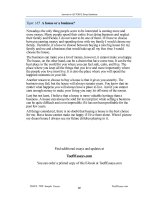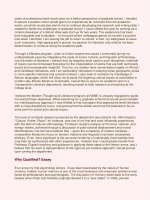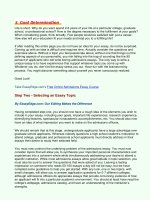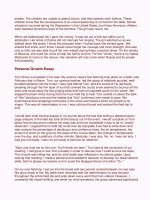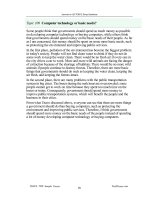Answers to all toefl essay question part 49
Bạn đang xem bản rút gọn của tài liệu. Xem và tải ngay bản đầy đủ của tài liệu tại đây (42.01 KB, 10 trang )
Content provided by EssayEdge.com
Put Harvard-Educated Editors to Work for You!
Law School Statement Samples
Why Law? Essay
My interest in the law began with donuts. As a child, I developed early persuasive skills
during family disagreements on how to divide boxes of the treats. My parents belonged to
the "biggest people deserve the most donuts" school of thought; while as the youngest family
member, I was a devout believer in the "one person, one donut" principle. The debates were
often cutthroat, but when it came to donut distribution, I sought justice at any cost.
As my family grew older and more health-conscious, we stopped eating donuts, and for
many years I forgot our childhood debates. However, some recent life decisions have
brought to mind those early explorations of justice.
When I first arrived at the American
International School of Rotterdam, I quickly learned that my colleagues were a diverse and
talented group of people. Unsure of how to establish my own place among them, I tried
phrases that had always worked to impress college friends. "When I work for the UN . . . ," I
told the second-grade teacher, and she answered with an erudite discussion of the problems
she faced as a consultant for that organization. I told the kindergarten teacher, "When I'm in
law school . . . ," only to hear about his own experiences in law school. By the time I
discovered that even many grade-school students were better travelled than I, I learned to
keep my mouth shut!
Living alone in a new country, removed from familiar personal and cultural clues to my
identity and faced with these extraordinary co-workers, I started to feel meaningless. How, I
wondered, could I possibly make a difference in a place as vast as our planet? To my own
surprise, I found that answer at church. Although I was raised in the Bah¨¢'¨ª Faith, I have
only recently understood the essential place that religion plays in my identity. Bah¨¢'¨ª social
beliefs include the need to work against extreme poverty, nationalism, and prejudice; and I
now realize that I cannot hold those beliefs without doing something about them. My identity
rests on these convictions; I cannot see the need for help and just move on. I have to help;
it's who I am.
The lessons I've learned from my international colleagues have channeled my desire for
service into the field of international development. I still wish to fight the "'Biggest Get the
Most' Theory of Donut Distribution," but now on an international scale.
Uniqueness Essay
Once in a while I am approached by past research associates who heard that I "got out," as
several of them put it, and who want to know how I handled the switch. Some of them have
no idea that people with science backgrounds have options other than research and
teaching, and many are discouraged by the thought that they would have to leave their
beloved science in other to engage in those activities. Several of them have called me from
home to ask these questions, for fear of being overheard at the laboratory.
The first thing I tell them is that there is far more to science than the "bench." I myself
entered the science field as an undergraduate, when I chose to study veterinary microbial
genetics. I worked in the laboratory of Dr. William Sischo, an epidemiologist who specialized
in number-crunching but who needed technical assistance with field sampling and laboratory
work to generate the data. Dr. Sischo instilled in me a strong desire to learn about and
experiment in genetics. I was fascinated by the many ways genetics can be used to help
understand how or why certain biological functions occur, and I wondered how I could use
my knowledge of genetics to benefit society.
After I obtained my bachelor of science degree, I went on to graduate school earning a
master of science degree part-time while working full-time jobs in a couple of well-establish
research institutions. I enjoyed both graduate school and working in the laboratory. I also
learned the "correct" career path-an academic position at a respectable research university-
was what we were supposed to want out of life. More specifically, academic laboratories
were acceptable, but working in industry, even to do research, was generally looked upon as
"selling out." I believe this attitude has relaxed somewhat since then, since grants and jobs
have become harder to secure and tenured positions lack the security they once possessed.
It was during my graduate studies that I began to question my goals and the assumptions
they were based on. I was becoming increasingly unhappy with the direction my career was
heading, and I began to question my abilities and motivation. Finally, when I heard myself
mutter out loud "I don't want to do bench work forever," I sat up and took notice. I decided
that in spite of my training, and even though I still loved science, research was not right for
me.
I wanted a career, or at least a job for starters, that valued my graduate degree and training,
and that was a better fit for my skills and future ambitions. I decided I would do best with a
job that was externally driven either by deadlines or by the needs of others; in addition, I
wanted to talk, write, and/or evaluate science as a whole rather than focus on one particular
aspect of a research project.
As a molecular geneticist, I had occasionally interacted with the patent department at
SmithKline Beecham Pharmaceuticals in support of my supervisor's patent applications.
They worked on a variety of intellectual property issues in a number of scientific disciplines
that were of interest to the company. I realized then that I could make very good use of my
science background as a patent attorney.
Earlier this year, I accepted an offer to work as a patent agent in the Corporate Intellectual
Properties Department at SmithKline Beecham. The job involves writing and prosecuting
patent applications, which in turn requires broad knowledge of both science and law. I soon
realized that, in order to become an effective patent practitioner, I must become intimately
acquainted with U.S. patent law. Because SmithKline Beecham is an international
corporation, I have also learned a great deal about international patent law so that I can
assist in foreign prosecution of SmithKline Beecham's patents. When I first started the job, it
occurred to me that my learning curve was a cliff with an overhang, and I was at the bottom
looking up.
I was extremely lucky to find a job almost immediately following graduation last January.
However, this opportunity was not trouble-free; there were additional risks to consider at the
time I made the decision to change. Our company was in the middle of negotiations to merge
with another international pharmaceutical company, GlaxoWellcome Pharmaceuticals. As
details of the merger were released, we were informed that the majority of the money saved
in the merger was going to be invested back into research and discovery. In other words,
because of the patent applications that I draft and prosecute, my job as a patent agent will
play an essential role in the inventive process in the new company. Daily interaction with
inventors keeps me up-to-date with cutting-edge technology in the biotechnology field. As my
work progressed, I knew I had made the right decision, and I have never looked back.
In October, I took the complex patent bar examination. My determination to take the
examination straight away was derived from my desire to become a registered patent agent
before entering law school, so that my academic studies will not suffer while I attempt to
balance a career and my education. I am now hoping to complete the career transition over
the next four years by attending law school at Villanova University and becoming a patent
attorney. A few weeks ago, I was offered the opportunity to move to our new research facility
in North Carolina, but declined the offer in hopes of attending Villanova's law program, which
is well respected among the various pharmaceutical companies on the East Coast for its
intellectual property education.
Intellectual property is a crucial asset to our company, and I take generating and protecting
these assets very seriously. A considerable part of my job involves "translating" science for
attorneys and patent law for scientists. I also have to be able to understand a new result
quickly enough to grasp what the specific invention is and ask further questions which allow
me to distill the invention down to its bare essence. Organization is also key-this is
something I learned as a matter of self-preservation, since this is a deadline-driven, and
sometimes crisis-driven, job.
I now believe that my job as a patent agent is not a break with the past; rather, it is an
exciting, alternative continuation of my career as a scientist. The patent applications that I
draft and prosecute make me a critical part of the inventive process at SmithKline Beecham.
Furthermore, my interactions with inventors on a daily basis keep me up to date with the
latest technology. Not so long ago, when I began research as an undergraduate, I wondered
what impact I would have on the development of new scientific knowledge. Through my work
as a patent agent, I know that I am a key participant in the promotion of scientific progress.
I still run into acquaintances from my research days who ask me why I "left science." I am
quick to set them straight. I may not get my hands wet, but I use far more of my education
and training than I ever did at the bench, and I am very much still in science. I firmly believe
my experiences in science and patent prosecution will allow me to be a creative and
contributing member of Villanova University, both as a student and as a future attorney
representing achievement.
Content provided by EssayEdge.com
Put Harvard-Educated Editors to Work for You!
Graduate School Personal Statement Secrets
EssayEdge.com contains thousands of pages of free admissions essay advice by Harvard-
educated editors.
The best way to approach your personal statement for graduate school is to imagine that you
have five minutes with someone from the admissions committee. How would you go about
making the best case for yourself while holding the listener's interest? What would you
include and omit in your story? Figuring out the answer to these questions is critical to
successfully preparing an effective statement.
To arrive at these answers, you should begin by asking yourself two specific questions:
●
Why have I chosen to attend graduate school this specific field, and why did I choose
to apply to this particular school's program?
●
What are my qualifications for admission?
The answers will not necessarily come easily to you, but this exercise will have great
practical benefit in readying you to write an outstanding personal statement. By answering
each question thoroughly, you will have given much thought to yourself, your experiences,
and your goals, thereby laying the groundwork for formulating an interesting and persuasive
presentation of your own personal story.
As the founder of EssayEdge.com, the Net's largest admissions essay prep company, I have
seen firsthand the difference a well-written application essay can make. Through its free
online admissions essay help course and 300 Harvard-educated editors, EssayEdge.com
helps tens of thousands of student each year improve their essays and gain admission to
graduate schools ranging from Harvard to State U.
Having personally edited over 2,000 admissions essays myself for EssayEdge.com, I have
written this article to help you avoid the most common essay flaws. If you remember nothing
else about this article, remember this: Be Interesting. Be Concise.
Why Graduate School?
Graduate school is a serious commitment, and it may have been your goal for a long time.
Describing your early exposure to a field can offer effective insight into your core objectives.
Watch out, however, that you do not your point in such a clich¨¦d, prepackaged way as to
make your reader cringe. For example, you should not start your essay, "I have always
wanted to?." or "I have always known that _______ was my calling." Instead, you should
discuss specific events that led to your interest in the field.
Graduate school is, of course, a means to an end, and admissions committees prefer
students who know where they're going and to what use they'll put their education (though
the occasional soul-searcher, who may exhibit exceptional raw potential, is welcomed). For
many people, the long-term goal is to work in academia, and to differentiate yourself in such
cases, you can stress more specific objectives such as your research interests.
Note: Read the instructions carefully. Sometimes schools will ask for a statement of purpose
describing your specific research interests in lieu of, or in addition to, a personal statement
that emphasizes your character and qualities. For these types of essays, you can assume
that a faculty member will be reading your statement, but it should still be accessible enough
for a non-specialist to understand. Remember that such essays should also still aim to
engage the reader in a way that conveys your own enthusiasm for the subject matter.
Avoid mistakes like discussing the school's rank or prestige, or simply offering generic
praise. Instead, mention faculty members by name and indicate some knowledge of their
work. Consider contacting faculty members first and discussing their current research
projects and your interest in studying under them. Then refer to these contacts in your essay.
Why Am I Qualified?
The way to prove your qualification is not to list attributes you believe you possess but to
discuss concrete experiences that show your abilities and qualities. As always, details are
paramount. The rest of your application has already summarized your accomplishments and
your activities. Show the reader what you did in concrete terms, and again, highlight your
active roles.
The experiences that demonstrate your qualification are not necessarily distinct from those
that explain your motivation. You shouldn't plan on dividing the essay into two separate
sections for each, but rather organize the structure by topic and extrapolate insights as they
develop. It's important that you think of the essay as an integrated whole, not as a checklist
of questions you must answer.
Focus on research experience, since research will be your main job for the duration of your
studies. Be specific about what you did. If you worked for a year under a professor, you
might consider emphasizing one particular project and exploring that in depth. The
experience does not have to have been a major undertaking: Any practical experience can
be used as long as you demonstrate your enthusiasm and aptitude for the field of study.
Remember to keep the discussion personal. Do not get bogged down in minute details and
jargon. Ultimately, the focus of the story should remain on you and your growth or success.
TOP 10 GRADUATE SCHOOL ESSAY WRITING TIPS
1. Don't Write a Term Paper.
